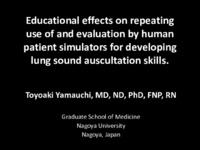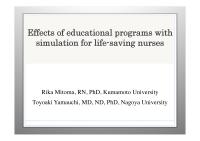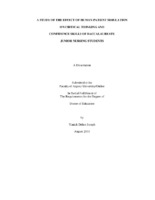| dc.contributor.author | Yamauchi, Toyoaki | en |
| dc.date.accessioned | 2012-09-12T09:20:01Z | |
| dc.date.available | 2012-09-12T09:20:01Z | |
| dc.date.created | Monday, July 30, 2012 | en |
| dc.date.issued | 2012-9-12 | |
| dc.identifier.uri | http://hdl.handle.net/10755/243278 | |
| dc.description.abstract | <p><strong>Purpose:</strong> A purpose of this study was to clarify effects of utilizing human patient simulators for development of auscultation skill on lung sounds.</p>
<p><strong>Methods:</strong> For the nurses who participated the three times consecutive series of workshops about physical assessment, evaluation examinations on auscultation skills for lung sound by using human patient simulators had been repeated six times as follows: the first (initial pre-workshop), the second (at the initial post-workshop), the third (the second pre-workshop), the fourth (at the second post-workshop), the fifth (the third pre-workshop) and the sixth (at the third post-workshop). Total numbers of nurses who participated all six sessions were 25.</p>
<p><strong>Results:</strong> Wheezes, rhonchi, fine crackles, normal breath sound, bronchial breath sound, and absent of right lung sound were shown the correct answer rates better by repeating lectures / practice / tests for auscultation skills on lung sounds. Regarding to rhonchi, wheezes and fine crackles, the more times repeating evaluation examination on auscultation skill, the better outcomes were. Identifying locations of those abnormal lung sounds was shown difficult. It appeared that coarse crackles had been difficult to distinguish with other lung sounds. Regarding to pleural friction rub, a repeating evaluation examination on auscultation skills did not improve the correct answer rate.</p>
<p><strong>Conclusion:</strong> Human patient simulators are effective and powerful to develop physical assessment skills.</p> | en |
| dc.format | Text-based Document | en |
| dc.language.iso | en | en |
| dc.subject | Human Patient Simulators | en |
| dc.subject | Physical Assessment | en |
| dc.subject | Educational Application | en |
| dc.title | Educational effects on repeating use of and evaluation by human patient simulators for developing lung sound auscultation skills | en |
| dc.type | Presentation | en |
| dc.rights.holder | <p>
All rights reserved by the author(s) and/or publisher(s) listed in this item record unless relinquished in whole or part by a rights notation or a Creative Commons License present in this item record.
</p><p>
All permission requests should be directed accordingly and not to the Sigma Repository.
</p><p>
All submitting authors or publishers have affirmed that when using material in their work where they do not own copyright, they have obtained permission of the copyright holder prior to submission and the rights holder has been acknowledged as necessary.
</p> | en |
| dc.description.note | <p>Items submitted to a conference/event were evaluated/peer-reviewed at the time of abstract submission to the event. No other peer-review was provided prior to submission to the Henderson Repository.</p> | |
| dc.type.category | Full-text | en |
| dc.evidence.level | N/A | en |
| dc.research.approach | N/A | en |
| dc.contributor.department | Zeta Omega at-Large | en |
| dc.author.details | Yamauchi, Toyoaki, MD, ND, PhD, FNP, RN | en |
| dc.conference.name | 23rd International Nursing Research Congress | en |
| dc.conference.host | Sigma Theta Tau International | en |
| dc.conference.location | Brisbane, Australia | en |
| dc.date.conferenceyear | 2012 | |
| dc.description.reviewtype | Abstract Review Only: Reviewed by Event Host | en |
| dc.description.acquisition | Proxy-submission | en |





